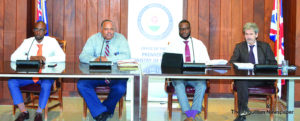The Honourable Premier of Anguilla, Dr. Ellis Webster, has announced that the Good and Services Tax (GST) must be implemented in order to honour the agreements in the MOU which the previous administration signed with the British Government on June 11th 2020. He stressed this during the weekly press briefing on Monday, February 22nd, saying that the financial assistance promised by the UK, intended to mitigate the impact of the COVID-19 pandemic, was contingent upon this taxation — as part of that MOU.

During the press conference, the Premier introduced a team of officers, charged with responsibility for making provisions for the collection of taxes payable to Government by the public. The officers included: the Comptroller of Inland Revenue Department, Mr. Lonnie Hobson; the former Comptroller, Mr. Kiel Connor, Comptroller of Customs and British Tax Advisor, Mr. Peter Harris.
The Premier sought once again to explain why the GST was so necessary for Anguilla, especially in this COVID-19 era. He stated: “When this Administration came into office, we were informed that we had ten days to decide if we would accept the MOU as signed between the Government of Anguilla and the UK Government. If we did not accept it, then the EC$100 million forthcoming from the UK for COVID-19 relief would have not been available.
“Though leading up to the elections we had campaigned against the imposition of the GST, under these conditions we felt that, in the interest of the country, we would accept the MOU, as it was, inclusive of the GST. And, so now, it has to be brought into effect. We had initially objected to the implementation of this tax, because we felt that it would increase the cost of living in Anguilla. We had felt that even though it is a broad-based tax that would bring in predictable revenue to the Treasury, we were of the view that it was not the right way to go, back then.
“Today, however, we consider that the implementation of the GST is necessary — based upon the MOU that was signed. By accepting the MOU, it has allowed us to get the money from the UK to keep Anguilla running while we are going through this pandemic. We had to have relief money for those who are unemployed and underemployed. Social Security had paid each qualified unemployed person $1,000 per month for the first three months. Then, with this money provided by the MOU, we were able to accept our responsibility and reimburse Social Security for the payments that they made during those first three months.”
The Premier went on to comment on the state of the economy, indicating that these monies received under his Government’s agreement with the MOU had gone a long way to cushion the economic fall. “The fiscal position of the economy has not improved,” he said, “because we have an economy that is dependent upon tourism — and tourism numbers have been drastically reduced from what they were during the first two months of 2020. Most likely tourism figures won’t be back up to the level at which they were until 2023/2024. Thus, our agreement with the MOU has helped.”
He then asked the IRD Comptroller, Lonnie Hobson, to give an update on the preparations for, and the implications of, the GST. “The GST will impact each and every one of us,” Mr. Hobson said. “It is critical for the IRD to meet with the various sectors that would be affected in order to help shape the GST legislation. We are now finalising the rates and the threshold, and we are working along with the IMF in this regard. The intention is to use the GST as a catalyst for restructuring the entire tax system. Doing this would create less reliance on customs duties, and related fees, for revenue generation. We hope that this will also create a new culture of voluntary tax compliance.”
“With the introduction of GST,” he noted, “five existing taxes will be replaced. These are the accommodation tax, the communications levy, the environmental levy, public entertainment tax and the interim goods tax. The GST will also broaden the tax base to include supplies which are not currently taxed.”
That brief explanation on the effects of GST, at the press briefing, came as a precursor to a Government consultation meeting that was held at the House of Assembly gallery that same evening, Monday, February 22nd. There, after discussing the GST with members of the public, Government informed the attendees that the tax would be implemented as of January 1st, 2022.
– Staff Reporter, James R. Harrigan







